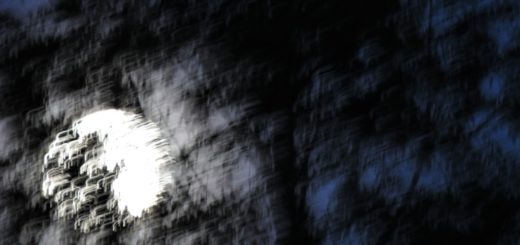Van the Man
We live in a world in which character and courage are measured in increments of one, by which I mean that we encounter so little public virtue today that any instance which does appear stands out before our consciousness in startling contrast with the surrounding moral emptiness. There can be no doubt, at the first glimpse of such an anomaly, that we are seeing something singular — something, in fact, that we had almost lost hope of ever seeing again, traveling as we are through our seemingly interminable tunnel into the nothingness.
In the current greyness — British spelling of “grey,” for reasons appropriate to today’s topic — in which all men who speak at all seem to be engaged in a mad scramble to outdo one another in complete indistinguishability and establishmentarian self-subjection, few human types fill my soul with more sputum than our ever-expanding list of “socially conscious celebrities.” You know them, and indeed can barely set foot in the muck of death-stage modernity without trudging through dozens of them on a daily basis: the actors, singers, writers, and comedians so proud of themselves for spouting the same progressive platitudes and totalitarian talking points as all the others, and as their establishment rulers, on every issue, in every forum, without exception.
For more than a year now, we have watched the democratic governments of the world exploit a mere virus pandemic, and very far from the worst such pandemic, as an excuse for ever more unhinged assertions of arbitrary power — power that establishes precedents that would have seemed so infeasible to most men a mere fourteen months ago that anyone who warned of such a possibility in 2019 would have been laughed into silence as a raving lunatic or “conspiracy theorist.” And in the midst of all this overt tyranny — euphemized as “covid restrictions,” as though the virus itself were instituting public policy without debate or moderation — the socially conscious celebrities are out there in force, or rather indoors by force, doing what popular entertainers always seem to do, namely carry water for tyranny.
“Zoom Bathroom Concert for Covid,” “Stay at Home Dancing With the Stars,” “Yo-Yo Ma Plays Bach for the Covid Dead” — all of these are products of my imagination, and yet so plausible today that even I cannot say with certainty that they are not also the names of real events. This is why, in this moment of global takedown under the dark spirit of fearmongering power lust, I have lost all patience for the entertainer class. They have reduced themselves to the authorities’ pacifiers to numb the senses of the slaves. Personally, I like my slavery wide awake, and therefore refuse to be numbed, preferring instead even the nausea induced by the sight of surrounding compliance to the palliation of “getting through this together,” where “this” means irreversible subjugation.
In this age of celebrity worship and pop star influence, it is truly sickening that no one with a famous name — literally no one — is prepared to step forward like a thinking individual and ask uncomfortable questions, to risk the petty self-interest of his career path or his social status as an obedient foot soldier in the marching status quo of civilizational decay.
Well, not literally no one. For among all the world of entertainment, one man had the character to stand out as a beacon of decency and independent adulthood — a voice of freedom — amidst our dark uniformity. One man thought for himself, spoke without a government script, refused to comply, refused to sing about the joy of staying at home for the state. For his act of adulthood this man has been “cancelled,” as we say today of anyone who dares to be an individual and alive in this age of the tribal death cult.
Van Morrison, the Irish multi-instrumentalist and extremely recognizable singer, is a pop music star in the best sense of an earlier time, and a genuine legend in the genre — in many genres in fact, which is part of his legend. He has always been iconoclastic, individualistic, stubbornly unwilling to be “true to form.” That has been his appeal for generations of listeners, who see him as that rarest of entities in modern pop and rock music — a sincere musician steeped in tradition who plays and sings what he wants to play and sing, with his mind fixed on trying things and learning, rather than on repeating last year’s winning formula. Van Morrison has no formula. He just plays music he likes, as the spirit moves him — folk, blues, gospel, jazz — and he plays it all very well, even now at age seventy-five. “Van the Man,” his fans have affectionately called him for fifty years.
Last December, as I mentioned at the time, Morrison did the unthinkable in this time of ducking for cover and trying not to be noticed for fear of being “cancelled”: He wrote and recorded a series of protest songs in the truest sense, which is to say that unlike the norm in his field, he was protesting in the only way that really matters — alone, against the winds of pop coolness and corporate compliance. In other words, unlike the standard pop musician protest songs, Morrison was putting himself out there against essentially everyone, knowing full well what he was risking. The keynote address of his four-song protest cycle is titled, “No More Lockdown.”
For his troubles — for speaking truth to power in the way a real man would do it, without fellow-feeling and a shouting “generation” on his side — Morrison has been vilified, called out by his fellow artists, the media, the general public, and many of his own longtime admirers, accused of being “dangerous” and “irresponsible.” Dangerous for caring about freedom more than comfort. Irresponsible for refusing to accept a police state as a reasonable answer to a far from cataclysmic problem. They are trying to end his career, strip him of his legacy and his listenership, silence him and deny his decades of contribution, erase him. For that is what they do to men who speak the truth in an age of lies, and who stand upright against a spirit of collective submission. And that is why I am taking the time to talk about him here at length.
Morrison took on this personal project of honest rebellion primarily as a way to show support, moral and material, for his fellow musicians, particularly the less famous and well-heeled, whose livelihoods depend on live performance, and who were therefore suffering immediate personal hardship under Britain’s lengthy lockdowns. He put out the word to his fellow musical elites, inviting them to join him. In spite of his enormous reputation and the unsurpassed respect he garners among Britain’s popular musicians, he received only one positive response, from seventy-six year old Eric Clapton, who sings and plays guitar on one of the four songs — and whose well-known voice probably has not sounded this urgent and fierce in decades. There is a moment in Brave New World when John, the innocent savage boy sickened by the soma-enslaved low-caste minions around him, lashes out by throwing away their soma rations, pleading with the idiots to embrace their freedom at last. Of course, they cannot understand, and instead charge at John to tear him to pieces for denying them their drugs. Arriving late on the scene, and seeing what is happening, John’s two modern world friends are faced with the choice of risking their lives to join him in the fight against this angry mob, or saving themselves by staying out of it. One chooses to risk his life and feel like a man for once; the other cowers and prays for the police to arrive. Clapton chose manhood, and one can hear what it means to him as he growls out the lyrics of the bluesy “Stand and Deliver”: “Do you want to be a free man, or do you want to be a slave? / Do you want to wear these chains until you’re lying in the grave?”
That last couplet rhymes, which is quite unusual in these songs. One of Morrison’s earliest musical influences, as he explains in an interview from a few years ago, was a Scottish folk artist on a television program he watched as a child, who would translate the news headlines of the day into impromptu lyrics, arrange the vocal harmonies, and then perform them almost immediately on air. Morrison seems to have deliberately adopted this method for these songs, framing the lyrics more as alternative news reports or prosaic commentaries than as anything similar to poetry (though his typical lyrics are famously poetic), as though wishing to emphasize that this is no time for prettified sentiments, but rather a time for blunt talk, harsh truth. “Enslave” is not a particularly euphonious word, but it is a particularly apt and accurate word for the situation, so Morrison employs it without hesitation — repeatedly, in fact, throughout this cycle of songs.
The two best songs in the group (for this listener whose tastes in popular song style run decidedly away from the standard rock music tropes) are “No More Lockdown” and “As I Walked Out,” in which Morrison turns to two traditional musical arenas where he is one of the few living masters.
“No More Lockdown” is a blues, composed in the most authentic style, and pointedly chosen for that genre’s original spirit as an oppressed people’s form of lament-cum-uplift. The song is kept bare and simple by Morrison and his small group of supporting musicians, with the repetition elevated by Morrison’s blunt words, and even more so by his increasingly intense vocalizing after the talkative main lyric is finished, his voice as strong as ever at seventy-five. I am not aware of any modern singer who captures the essence of blues in the pre-rock mode more purely than Van Morrison — understandably, since he grew up in a household ringing with blues and Lead Belly music. Every time he emphatically chants the words “No more” during his reprise of the verses in the song’s pugnacious middle section, the listener — at least one who is not busily typing an angry tweet from his kitchen about how irresponsible freedom is — feels pulled forward in his chair, as though this were no time for taking things sitting down.
Here is the song:
For my other favorite, “As I Walked Out,” Morrison returns to the Irish folk music side of his roots, overlaid with hints of gospel in the organ part — he has spent much of his musical career exploring a sort of Celtic Christian mysticism — as well as displaying the most extreme example of the news-report-style lyrics described above. The song’s folksy refrain, “Why are they working / and why are we not?” — similar to the “God-given rights” theme recurring throughout these songs — brusquely yanks the long-muted microphone from the hands of all the fake voices of freedom that pretend to represent the downtrodden “common man,” but in truth only demean and help to enslave him. He reminds his cowardly contemporaries and compliant juniors that the legitimate heritage of these modern folk forms was as succor and support for those truly suffering the denial of their rights and dignity. He demands with his refrain that today’s Marxist morality apologists, our profiteering “social justice” whores, face the truth of their essential betrayal of their own traditional role and their own former power as a potential force for good. They will not face that truth, as they are all too busy hiding under the kitchen table waiting for the progressive administrative establishment to tell them what to say next, but Morrison’s challenge makes its point all the same, for the few of us still able to hear freedom’s voice.
The nickname “Van the Man” has taken on a whole new and higher significance in Morrison’s presumed twilight years — which also happen to be civilization’s twilight years. “Man” is a worthy title of honor these days, to be bestowed only rarely, as we so infrequently witness the phenomenon that we might easily forget what it ever meant, were we not blessed with the occasional shimmer of light in our indefinite tunnel, “as we walk out.”


